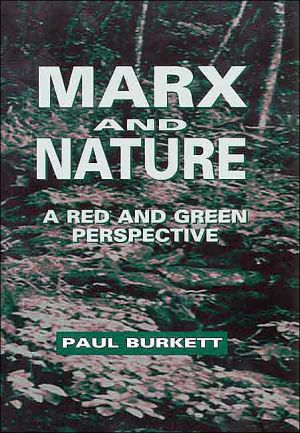

 |

|

The average rating for Marx and nature based on 2 reviews is 3.5 stars.
Review # 1 was written on 2016-12-25 00:00:00 Mark Caruso Mark CarusoA perfect book to finish on Xmas Day, considering it's both Red and Green. 1. The book is Marxology, that is, a book interpreting and defending Marx (and Engels). 2. Burkett mostly succeeds in showing there is nothing necessarily anti-ecological about Marx's conception of communism. Associations of free producers operating production according to use value rather than abstract exchange value--intrinsic worth and need rather than profit--can be better common, social administrators of resources than weird capitalist beings that feast and grow infinitely. 3. The author does not, however, establish that Marx did not exhibit certain anti-ecological tendencies in parts of his work. Nor does he establish that Marx's communism is the most effective or powerful ecological/political theory, and in defending it against criticism, demonstrates that there are many valid and live problems with Marx's ideas for those who want to uphold Green politics. 4. Read this book if you are specifically interested in dialogue about Marx & Engels themselves and not a full treatment of Marxism's history of ecological or anti-ecological theory and activity. |
Review # 2 was written on 2014-05-29 00:00:00 Todd Hanson Todd HansonMarx and Nature is a challenging, but very important book for all those concerned with developing and acting on the ecological insights in Marxist theory. Its republication is long over-due, but should offer new readers the opportunity to grapple with Paul Burkett's analysis, and build on the ideas here. It has a new foreword by John Bellamy Foster which locates the book in the wider debates that have arisen among Marxist thinkers since its publication. In Marx and Nature Paul Burkett takes up a number of arguments that are made regarding Marx's ecological thinking. A common criticism, that Marxism is "Promethean" in its vision of the development of the forces of production is challenged very effectively here. Burkett notes though, it is not just anti-Marxists who make this criticism, but it also occurs from among Marxists too. Burkett quotes Michael Lowy for instance, suggesting that "There is a tendency in Marx... to consider the development of the forces of production as the principal vector of progress, to adopt a fairly uncritical attitude toward industrial civilisation, particularly its destructive relationship to nature." Burkett effectively challenges this view through the book. He does this by returning to the very core of Marx's ideas, and showing how, at almost every stage of Marx's intellectual development, the question of human relationships to nature is key. Full review: |
CAN'T FIND WHAT YOU'RE LOOKING FOR? CLICK HERE!!!